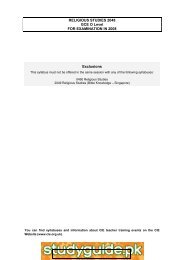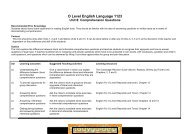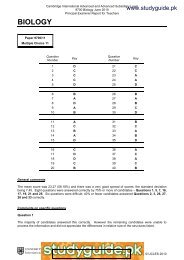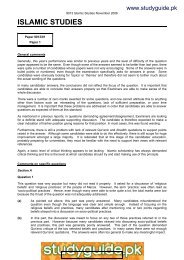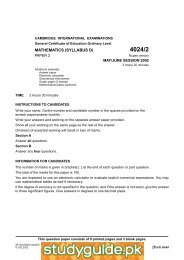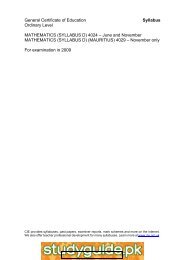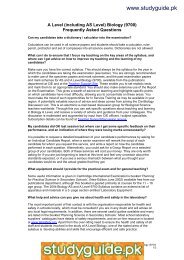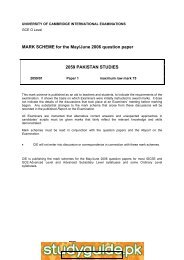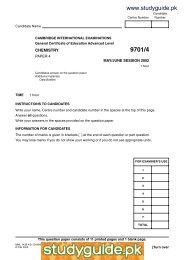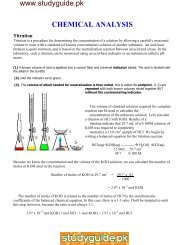There were some impressive answers, showing an ability to bring together details from both texts in 140words of correct French. The skills of summary do seem to have improved. Weaker candidates tended toconcentrate on one or two areas instead of drawing on all the points raised by the rubric. Others liftedundigested chunks of text from the original passages. It is, of course, permitted to use key vocabulary andphrases from the texts, but indiscriminate lifting of material often shows lack of comprehension and fails tomake the relevant points to gain the content marks. Some candidates gave their own opinions, which werenot required for this task. In general, however, content marks for this exercise were high, as candidateslisted the solutions proposed in the texts. Standards of accuracy were varied widely. Some candidatesappeared to have great difficulty in putting together 140 words of accurate French. The best candidates,however, produced impressive versions and scored 4 or 5 for language.Question 7To gain good marks on this part of the examination, candidates must write accurate French. There is, ingeneral, no problem for the candidate in locating the part of the English text containing the answer. But,there are fewer candidates who can express the answer accurately. Often, marks are lost for grammaticalerrors, such as errors in agreements, wrong use of verbs etc.Question 8As with Question 6, it is important for candidates to limit themselves to 140 words, and they should note thatthe rubric requires both response to the text and an element of personal response. The 10 marks forContent are divided equally between these two elements. In general, the 5 marks for reference to the textcould be scored without great difficulty, drawing from a range of possible statements. The intention here wasthat candidates should focus on Jospin’s policies for dealing with delinquency. This was well done and mostcandidates scored 3-5 marks here. The personal response was also well done and showed an improvementon previous sessions. Many candidates wrote expressing disagreement with the measures announced andexplained that the roots of delinquency with the measures announced, and explained that the roots ofdelinquency were in social and educational problems.As with Question 6, the quality of written French was often poor. Quite a number of candidates appear tomanage a fluent style in terms of sentence construction, but to be unable to get endings and agreementscorrect.Paper 9098/04EssayGeneral commentsThis year’s answers displayed quite a wide spread of linguistic ability, ranging from the consistentlyaccurate and fluent, to a number of scripts which reflected little ability to go beyond the productive use ofIGCSE grammar.Stronger candidates produced answers that read easily, that were quite ambitious in the use of complexstructures and that contained varied and interesting vocabulary. Answers generally remained relevant tothe question, and contained a good range of examples and references. Essays were competentlystructured, with well paragraphed arguments leading to a sound conclusion. The following are examples ofwork in this category:• Quoique le système d’éducation dans mon pays soit pour la plupart efficace, à mon avis certainschangements sont nécessaires.• Personne ne peut nier le fait que la société moderne est obsédée par la sécurité; soit publique, soitpersonnelle.• Il serait faux pourtant de croire que l’agressivité n’existe pas dans les pays tiersmondistes.Candidates in the middle of the range displayed a fair level of accuracy, with common tenses and verbforms mostly correctly formed. Expression tended to be rather forced but showed an attempt at variety.12
There was some variation in the choice of vocabulary, with some use of less common words. The contentof answers in this category was not always relevant, though ideas were usually quite well structured andorganised into paragraphs. Conclusions reached were not necessarily related to the main body of theargument. Areas of language in which candidates were not consistently confident included the use ofsome prepositions, various types of pronouns, some irregular verbs and more difficult tenses. Examples ofthe types of error found in this category follow.• Les problèmes principaux qu’on fait face à ...• Les jeunes, an ne leurs donne pas assez de respect. Il faut donner leur plus.• Certaines compagnies internationales font beaucoup d’argent par exploitant les jeunes.Towards the bottom end of the ability range the overall quality of language barely rose above the basicrequirements of IGCSE French. Scripts displayed persistent errors in tense and verb forms, andcandidates showed that they were having difficulty in handling the agreement of subject and verb endings,the agreement of adjectives, basic pronouns and the spelling and/or gender of essential subject-specificvocabulary. Examples of errors common amongst essays in this category follow.• Common misspellings: se for c’est; qu’y for qui; car même for quand-même; malgrê(s) for malgré;ceux qui for ce qui; tous le monde; vraiement; especialement; quelques fois; chaque-un, pour example,sans doubte, system, problem.• Confusion and misuse of ces and ses.• Confusion and misuse of de and des; Une vie pleine des changements..., La plupart de gens...• Use of leur as an adjective only in its plural form: Les pays défendent leurs territoire avec leurs armée.• Similarly, use of leur as an adjective only in its singular form: Les enfants ne repectent pas leurparents...• Verb endings agreeing with the object pronoun instead of with the subject; Cela nous montrons que...• Plural verb endings used as an adjectival ending; ...des choses difficilent à comprendre..., Tous cesprogrès faitent ..• The wrong plural form of common adjectives: touts for tous, cettes for ces, notres for nos, votres forvos.Candidates would benefit from leaving themselves with adequate time for a thorough and systematicrevision of their essay, re-reading it several times and on each reading checking only one aspect of thelanguage, for example, firstly, all verb forms and endings, then all adjectival agreements and so on.Paper 9098/05Texts/Thematic StudiesGeneral commentsThe format of the examination presented little or no difficulty to candidates, who appeared, for the most part,at home with the instructions and layout. Very few candidates answered more than the specified number ofquestions, and this tended to be in Centres with just a few entrants. Teachers should be particularly carefulto explain the rubric to such groups, since the candidates have fewer reference points amongst the peergroup.13



